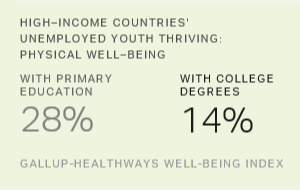WASHINGTON, D.C. -- The 4 in 10 underemployed Americans (41%) who currently do not have health insurance are among those who stand to benefit from the healthcare reform bill poised to become law. The underemployed are currently more likely than the fully employed to lack money for healthcare and are less likely to have a doctor or have visited a dentist.

These results, based on ║┌┴¤═° Daily tracking in January and February, include interviews with nearly 40,000 adults aged 18 and older in the U.S. workforce. ║┌┴¤═° classifies respondents as "employed" if they are employed full time or are employed part time and do not want to work full time. Respondents are considered "underemployed" if they are employed part time but want to work full time or are unemployed.
The findings illustrate the strain that underemployment currently places on the U.S. healthcare system. Of the underemployed who do have insurance, more than half (52%) receive coverage through a government program or something else. By contrast, three-quarters of employed workers (76%) have insurance through an employer or a union.

Implications
With the healthcare reform legislation that the House passed on Sunday poised to make healthcare more affordable for the underemployed, ║┌┴¤═° data provide a benchmark for the strain underemployment currently places on the U.S. healthcare system. If the underemployed are more able to purchase healthcare insurance in the future, they likely will be able to increase preventative behaviors such as visiting a doctor or a dentist. However, with and most of the new healthcare reform provisions set to begin in 2014, underemployment will continue to affect the U.S. healthcare system for some time to come.
Survey Methods
Results are based ║┌┴¤═° Daily tracking interviews with a random sample of 39,255 national adults who are part of the workforce, aged 18 and older, conducted Jan. 2-Feb. 28, 2010. For results based on the total sample of national adults, one can say with 95% confidence that the maximum margin of sampling error is ┬▒1 percentage point.
Interviews are conducted with respondents on landline telephones (for respondents with a landline telephone) and cellular phones (for respondents who are cell-phone only).
In addition to sampling error, question wording and practical difficulties in conducting surveys can introduce error or bias into the findings of public opinion polls.
About the ║┌┴¤═°-Healthways Well-Being IndexÔäó
The ║┌┴¤═°-Healthways Well-Being Index measures the daily pulse of U.S. well-being and provides best-in-class solutions for a healthier world. To learn more, please visit .
